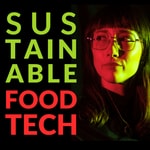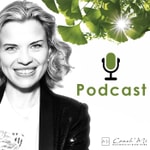Red to Green Food Sustainability 🥩🔬♻️ – Détails, épisodes et analyse
Détails du podcast
Informations techniques et générales issues du flux RSS du podcast.

Red to Green Food Sustainability 🥩🔬♻️
Marina Schmidt
Fréquence : 1 épisode/20j. Total Éps: 81

Classements récents
Dernières positions dans les classements Apple Podcasts et Spotify.
Apple Podcasts
🇩🇪 Allemagne - entrepreneurship
18/02/2025#87🇬🇧 Grande Bretagne - entrepreneurship
29/12/2024#67🇩🇪 Allemagne - entrepreneurship
21/11/2024#98🇩🇪 Allemagne - entrepreneurship
18/10/2024#89🇩🇪 Allemagne - entrepreneurship
13/10/2024#67🇩🇪 Allemagne - entrepreneurship
12/10/2024#43
Spotify
Aucun classement récent disponible
Liens partagés entre épisodes et podcasts
Liens présents dans les descriptions d'épisodes et autres podcasts les utilisant également.
See all- https://www.linkedin.com/feed/#
1654 partages
- https://www.linkedin.com/in/schmidt-marina/
139 partages
- https://www.linkedin.com/in/frankkuehne/
20 partages
- https://foodlabs.de/
78 partages
- https://www.foodpolitics.com/
30 partages
- https://nx-food.com/
27 partages
Qualité et score du flux RSS
Évaluation technique de la qualité et de la structure du flux RSS.
See allScore global : 68%
Historique des publications
Répartition mensuelle des publications d'épisodes au fil des années.
8.1. What is Micro Fermentation? New Cheeses Made with Koji Protein - Formo CEO Raffael Wohlgensinger
jeudi 12 septembre 2024 • Durée 49:59
Find out all the details about micro fermentation. Discover how Formo is using this process to churn out Koji protein-based cheese alternatives that are hitting over 2000 stores in the DACH region.
The episode breaks down the differences between micro and precision fermentation and why micro fermentation's quicker market route is so exciting.
Learn about the sustainability perks and the cool science behind cheese without cows. Whether you're into biotech, sustainable food, or just love cheese, this deep dive offers a taste of the future.
LINKS / Mentions
The Bright Green Partners overview on different types of fermentation https://brightgreenpartners.com/precision-fermentation/
Formo - https://formo.bio/https://formo.bio/
Raffa - https://www.linkedin.com/in/raffael-wohlgensinger/
Connect with Marina - https://www.linkedin.com/in/schmidt-marina/
Check out R2G Media - https://www.r2g.media/
Turtle Tree - https://www.turtletree.com/
Flora Ventures - https://www.floravc.com/
Foodlabs - https://www.foodlabs.com/
00:00 Introduction to Micro Fermentation
04:11 Product Launches
05:32 Deep Dive Micro Fermentation
17:31 Product Development and Consumer Testing
20:56 PF vs. MF in detail
27:24 Benefits of Koji
29:23 Regulatory Landscape
31:47 Fundraising Perks
34:44 Sustainability Impact
42:50 Partnering with Traditional Dairy Manufacturers
46:06 Go to market
47:08 Future Innovations
7. SEASON FINAL - BOOK TALKS - What Food Futurist are you? 🔮 Part II of Meals to Come
Saison 7 · Épisode 11
samedi 25 novembre 2023 • Durée 19:36
Let’s finish discussing our book “Meals to Come- The History of the Future of Food.”
If you haven’t listened to the previous episode, no, But it’s not required; I will summarise the key points.
You will hear about
- how modern solutions of cornucopias, Malthusian, and egalitarians look like
- why it can be useful to add an ecological perspective
- a tapestry of some of my favorite quotes from the book discussing how belief systems and rhetoric have shaped the future of food predictions. Super, super interesting.
And after about 10 minutes of that, we will get into the summary of the entire season.
I am joined by my cohost if Frank Alexander Kuehne, the Chief of the Advisory Board of the herb and spice producer RAPS and the Managing director of the Adalbert Raps Foundation, funding research on sustainable food science. More on that later
Here is a quick reminder from last episode describing the three types of food futurists - cornucopias, Malthusians and Egalitarians.
1. Cornocopians believe "innovation will fix anything" and throw tech at any problem. We need to go better, faster, and stronger with new approaches.
Main theme -> Innovate (biotech in food, cell ag, novel fertilizers, etc.)
2. Modern Malthusians believe we need to reduce our consumption, respect the earth's limits and find ways to reduce, reuse and recycle.
Main theme -> Save (AI to reduce food waste, CSR)
3. Egalitarians believe we would have enough if we would share it better. Environmental issues are a reflection of social inequality. Local is beautiful.
Main theme -> Share (Local markets, local food production, foreign development)
4. Ecologists (a category I added) believe we must live in line with nature again. Get off the chemical, agricultural treadmill and think in ecosystems.
Main theme -> Restore (agroforests, regenerative agriculture)
Ultimately, the solution is not an either-or but an "and." It helps to be aware of one "default" view and recognize which other perspectives may be good to develop.
Support Red to Green https://www.patreon.com/RedtoGreen
Get funding for your food science research: https://en.raps-stiftung.de/foerderbereiche/lebensmittelforschung
More info and links to resources on https://redtogreen.solutions/
Seeds of Science https://www.amazon.com/Seeds-Science-Why-Wrong-GMOs/dp/1472946987
Connect with the host, Marina https://www.linkedin.com/in/schmidt-marina/
Connect with the host, Frank https://www.linkedin.com/in/frankkuehne/
Please rate the podcast on Spotify and iTunes! <3
DISCLAIMER - The podcast and article represent the personal opinions and interpretations of the participants). The statements may be exaggerated for entertainment and/or comedic purposes. Every effort has been made to ensure the accuracy and reliability of the information presented per the cited sources. However, the participants do not guarantee the completeness or timeliness of the information. Readers are encouraged to verify the information presented and conduct their own research independently. The participants acknowledge that mentioned parties may have the right to an alternative interpretation of matters discussed.
7.1. Stuffed and Starved 🍔 Understanding Inequality in our Food System
Saison 7 · Épisode 1
mercredi 26 avril 2023 • Durée 28:56
Welcome to our season called "Book Talks." In the first two episodes, we will cover the book "Stuffed and Starved - the hidden battle for our world's food system."
The author Raj Patel is a British Indian. Academic journalist and activist. He holds a Ph.D. in development and sociology from Cornell University. In this book, he focuses a lot on the inequality of our food system. The book's main thesis is that more people are overweight than people who are starving. And that's solving the issue is now our food system is not just about increasing yield. It's much more a poverty and distribution issue.
I'm joined by my amazing co-host Frank Kuehne. He's the managing partner of the Adalbert-Raps Foundation, which offers grants for scientific research in food technology, but more on that later. Let's jump right in.
LINKS
Get funding for your food science research: https://en.raps-stiftung.de/
Find out more about the book Stuffed and Starved
More info and links to resources on https://redtogreen.solutions/
Connect with the host, Marina https://www.linkedin.com/in/schmidt-marina/
Connect with the host, Frank https://www.linkedin.com/in/frankkuehne/
More info and links to resources on https://redtogreen.solutions/
Please rate the podcast on Spotify and iTunes! <3
Hashtags:
Book Talks, Stuffed and Starved, Rajiv Patel, British Indian, food system, inequality, starving, poverty, distribution, food technology, multinationals, liberalization, market, food supply chain, farmers, producers, manufacturers, retailers, consumer base, buying desks, agricultural products, packed food, processed food, frozen food, retailer chains, sustainability, CO2 emission, NAFTA, North American Free Trade Agreement, US farmers, subsidies, Gimsa, Minsa, industrial corn flour market, structural power, multinational, local market, soy, wheat, Ukraine, local farmer, supply chain, African farmers, European market, African market, scaling up farms, efficiency, industrial large scale agriculture, regenerative agriculture, community supported agriculture, diversified crops, maize producers, subsidized corn, agricultural business, spice company, seasoning company, Olam, Fairtrade.
7. SEASON TRAILER - Books on the future of food 📕 Reviewing and discussing
Saison 8
jeudi 13 avril 2023 • Durée 01:20
Do you ever think, "Oh, I wish I would have more time to read books on the food system?" - well, my cohost Frank Kuehne and I are doing it for you!
Stuffed And Starved: Markets, Power And The Hidden Battle For The World Food System
The books we will cover
The Carbon Footprint of Everything - 2022 New Edition
Future Foods: How Modern Science Is Transforming the Way We Eat
Food Politics: How the Food Industry Influences Nutrition and Health
The World According to Monsanto: Pollution, Corruption, and the Control of the World's Food Supply
Seeds of Science: Why We Got It So Wrong On GMOs
Meals to Come: A History of the Future of Food
Regenesis: Feeding the World Without Devouring the Planet
Connect with Marina
https://www.linkedin.com/in/schmidt-marina/
Connect with Frank
https://www.linkedin.com/in/frankkuehne/
Check out the Adalbert Raps Foundation to apply for a grant for your master, Ph.D. thesis, or food science research (for your startup).
6. SEASON FINAL - Summary & Quiz on Biotech in Food - Precision Fermentation, Biomass Fermentation, Molecular Farming and More
Saison 6 · Épisode 12
mercredi 8 mars 2023 • Durée 32:16
I have something very special for you. You can see it as a quiz to test your knowledge and also a way to find out which topics you still want to look into more deeply. For each episode, I will ask you a question, give you time to answer it, so you don’t need to stop the audio, and then share how I would answer it. Even if you don’t come up with the answer, trying to look for it engages your brain differently. And helps to change “I heard something” to “I learned something.
Mentioned Resources
Jack Whitehall Comedy Gig
Paul Pimsleur - the active retention language learning approach
The US lags behind other agricultural nations in banning harmful pesticides
Other podcast episodes mentioned
From season 2 - PLA - plastic without fossil fuels
Season 5 final - questionable regulation and pink slime beef
LINKS
Check out our supporter of this season ProVeg Incubator and their 12-month incubator program: https://provegincubator.com/
More info and links to resources on https://redtogreen.solutions/
Connect with the host, Marina https://www.linkedin.com/in/schmidt-marina/
Check out our supporter of this season, FoodLabs, and their Climate Program: https://www.foodlabs.com/
More info and links to resources on https://redtogreen.solutions/
Please rate the podcast on spotify and iTunes! <3
Hashtags:
biotechnology, biotech, food biotechnology, food development, future of food, food innovation, food tech, food technology, alt proteins, alternative proteins, precision fermentation, biomass fermentation, molecular farming, cell-based milk, cultured meat
6.12. Regulatory approval in Europe vs. the US and Singapore with Seth Roberts, The Good Food Institute Europe
Saison 6 · Épisode 12
mercredi 22 février 2023 • Durée 36:52
Why is it so to get approved in Europe? What does the actual process look like? What are the steps? What do companies need to do? And what is the difference between the systems in Europe, Singapore, and the U.S.?
(All the technologies we covered this season have one thing in common: sooner or later, they need regulatory approval. But what does that mean? We often talk about the U.S. system, the FDA - the food and drug administration and the USDA, the United States Department of Agriculture. These two regulators work together for certain novel products like cultured meat.
But you may know that Europe has very high safety and quality standard. As one startup founder told me" "If you can get past Europe, you can get em all"
I love this topic, and we dive deep! If cultured meat, precision fermentation or biomass fermentation, or new terms for you, maybe check out the first episodes of this season to get an introduction.
LINKS
Check out our supporter of this season ProVeg Incubator and their 12-month incubator program: https://provegincubator.com/
More info and links to resources on https://redtogreen.solutions/
Connect with Marina Schmidt https://www.linkedin.com/in/schmidt-marina/
Check out our supporter of this season, FoodLabs, and their Climate Program: https://www.foodlabs.com/
More info and links to resources on https://redtogreen.solutions/
6.11. The investor's perspective on biotech 🎢 in food with Foodlabs Principal Christian Guba
Saison 6 · Épisode 11
mercredi 15 février 2023 • Durée 30:54
How venture capital shapes the biotech space, the challenges of biotech patents, the hype and bust of plant-based, and what the hell a venture studio does. I enjoyed this a lot and I hope you do too - let's jump right in!
LINKS
Check out our supporter of this season ProVeg Incubator and their 12-month incubator program: https://provegincubator.com/
More info and links to resources on https://redtogreen.solutions/
Connect with Marina Schmidt https://www.linkedin.com/in/schmidt-marina/
Check out our supporter of this season, FoodLabs, and their Climate Program: https://www.foodlabs.com/
More info and links to resources on https://redtogreen.solutions/
6.10. Scaling food biotechnology 📈 bioreactors, inputs and brains with GFI Lead Scientist Elliot Swartz
Saison 6 · Épisode 10
mercredi 8 février 2023 • Durée 35:11
We need to scale. But how? The biotech space is will go through some growing pains. Find out about scalability issues like bioreactor capacity, the supply of inputs, and the lack of brains. As well as lessons we can learn from vertical farming companies that are already a step or two further down the line.
Join me for a chat with Elliot Schwartz, he is the Lead Scientist for Cultivated Meat at The Good Food.
If you are not familiar with precision fermentation check out t episode 1 of this season where we explain a bunch of the terms.
LINKS
Check out our supporter of this season ProVeg Incubator and their 12-month incubator program:
https://provegincubator.com/
More info and links to resources on https://redtogreen.solutions/
Connect with Marina Schmidt https://www.linkedin.com/in/schmidt-marina/
Check out our supporter of this season, FoodLabs, and their Climate Program:
https://www.foodlabs.com/
More info and links to resources on https://redtogreen.solutions/
Hashtags for this episode
Bioreactor capacity
Fermentor
Scaling Biotechnology
Scaling food technology
Cultured Meat
Cultivated Meat
Cell-based meat
Lab-grown meat
Future of cultured meat
Hashtags for this season
Biotechnology in food
Food Tech
Food Technology
Future of Food
Food Innovation
What is biotechnology food
Food biotechnology examples
Food biotechnology startups
Biotechnology food companies
Biotech food in usa
Food biotechnology examples
Editor's note: this episode was lengthened with a ProVeg shout out at minute 8:30
6.9. Mimiking Honey and Monoculture Honey Productions 🐝 Melibio CEO Darko Mandich
Saison 6 · Épisode 9
mercredi 1 février 2023 • Durée 37:27
We lack bees, we lack insects and it's a severe issue for biodiversity. Because flowers are dependent on insects and vice versa, right?
So if you eat traditional honey, are you promoting bee health? No, large-scale monoculture is an issue in crop agriculture and beekeeping.
Hear from Darko Madrich, the co-founder and CEO of Melibio. I got to try their plant-based honey in Switzerland last year. And it tasted so similar I wondered whether they had just poured some natural honey into the bottle.
By the way, whenever I meet Darko, I feel his spirit animal would be a giant bumblebee. He has that vibe.
Anyway, Instead of using something like rice syrup, Melibio uses the compounds found in honey. Re-building it from the ground up.
In the future, they want to use precision fermentation to add a few compounds that are hard to replace. But is that necessary?
LINKS
Check out our supporter of this season ProVeg Incubator and their 12-month incubator program:
https://provegincubator.com/
More info and links to resources on https://redtogreen.solutions/
Connect with Marina Schmidt https://www.linkedin.com/in/schmidt-marina/
Check out our supporter of this season, FoodLabs, and their Climate Program:
https://www.foodlabs.com/
For sponsorships, collaborations or feedback write Marina at change@redtogreen.solutions
Hashtags for this episode
problems with honey
honey production
honey farming
pesticide impact on bees
honey alternatives
vegan honey
animal-free products
animal-free honey
Hashtags for this season
Biotechnology in food
What is biotechnology food
Food biotechnology examples
Food biotechnology startups
Biotechnology food companies
Biotech food in usa
Food biotechnology examples
Editor's note: on 17.02. a 1,5-minute partnership message was added at minute 7.
6.8. Cacao-free chocolate 🍫 and cacao's issues with WNWN Co-Founder Ahrum Pak
Saison 6 · Épisode 8
mercredi 25 janvier 2023 • Durée 30:59
Why is the cacao trade so broken? Why does chocolate increasingly cause new rainforest areas to be cut down? What if we could make chocolate from other sources? Join us for this episode with WNWN co-founder Ahrum Pak.
Check out our supporter of this season ProVeg Incubator and their 12-month incubator program:
https://provegincubator.com/
Check out our supporter of this season, FoodLabs and their Climate Program: https://www.foodlabs.com/
Connect with Marina Schmidt https://www.linkedin.com/in/schmidt-marina/
For sponsorships, collaborations or feedback write Marina at change@redtogreen.solutions
More info and links to resources on https://redtogreen.solutions/
Hashtags for this episode
cacao-free chocolate
chocolate farming
cacao farming
impact of cacao
cacao alternatives
WNWN company
biomass fermentation
traditional fermentation
cacao fermentation
Hashtags for this season
Biotechnology in food
What is biotechnology food
Food biotechnology examples
Food biotechnology startups
Biotechnology food companies
Biotech food in usa
Food biotechnology examples









